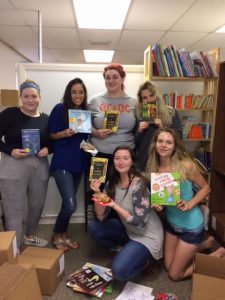The Teaching & Learning Excellence Division (TLED) highlights faculty successes in and out of the classroom as often as possible to celebrate #ACCexcellence. We call these folks Champions of Teaching & Learning Excellence.
TLED is excited to spotlight Dr. Linda Cox for her years working with students and local community organizations to make positive changes through service learning. While in college, Dr. Cox spent time volunteering in a GED program for women who had recently been released from prison, and though she was nervous in the beginning, Dr. Cox quickly learned how much of a positive impact her work had on both herself and those she was helping. Since then Dr. Cox has continued to work with her local community organizations, and in the years following found a way to incorporate community service into her courses.
In 2015, Dr. Cox received an Innovation Grant to adapt a PHIL 2306 Ethics course with a service learning component. The grant, in her own words, allowed her “to integrate service learning into the course design and, with the help of Lillian Huerta in the Service Learning Office, to allow all students, including those with limited transportation, to participate in the service learning on campus by serving our own ACC community.”
Service learning combines learning objectives with community service, providing a pragmatic and progressive learning experience. You can learn more online about how to incorporate these principles into your course. This type of educational approach gives students the opportunity to understand ethical problems from the perspective of the people who would be most affected by its resolution. Students are immersed in care ethics through this course, “which claims that listening to and working with those persons most directly affected by our policies allows us to make difficult ethical decisions more robustly than merely approaching the problem abstractly.”
Dr. Cox’s class first studies various ethical theories and then spends time applying those theories in local community organizations by getting together with community partners and gaining an understanding of how people are directly impacted by various problems. The three areas that are studied in depth are environmental ethics, women’s incarceration, and hunger and food distribution.
Environmental Ethics:
Dr. Linda Cox in front of her rainwater collection downspout (her students work with water conservation)
This service learning experience was done on campus for the benefit of ACC. The students recommended a plan that would convert a limited number of high-use toilets to more efficient models, thereby saving hundreds of gallons of water per day.
Women’s Incarceration:
The Women’s Storybook Project of Texas connects children with their incarcerated mothers through the joy of literature. The program visits 9 women’s prison units in Texas and helps women read and make recordings of children’s books. The book and the recording are then sent to each child. Many children start their day listening to the recording, as it is the only way they will hear their mother’s voice until she returns home. Student volunteers play a big role in the success of the project. As Student Volunteer Coordinator Kim Weidmann notes, “Volunteers inspect, sort and pack each new book that is donated to the project and manage record keeping of inflow and distribution of the new book inventory. Last year alone 2,530 books made their way from donation to a delighted child.”
Hunger and food distribution:
Many students did their service learning at the Central Texas Food Bank and found the experience fun and eye-opening. Student Zoë Richard created and implemented a research instrument (survey) to measure nutritional knowledge and food insecurity among student at the Pinnacle campus. Her conclusions were submitted to the dean of students and should inspire future policies and research to understand the nutritional needs of ACC students.
Students reported that working directly with community partners transformed their lives and helped them understand moral problems in a new light:
“I never really volunteered, but after this project, I want to go back and continue it every week.”
“I have always believed in serving the community, but now I am determined to help more.”
“The greatest lesson learned was that I don’t need money to make a great impact in my community.”
For both her students and her community, Dr. Cox is changing the ways students view their roles in local communities and providing much-needed help to local organizations. “I use service learning because it lets students have these direct encounters with people and programs in the community where they can see that they already have the capacity to be leaders and innovators in solving social problems.”
Tags: #ACCexcellence, austin community college, college, environment, ethics, food distribution, philosophy, service, service learning, student success, teaching and learning, women's issues
Back to Top


